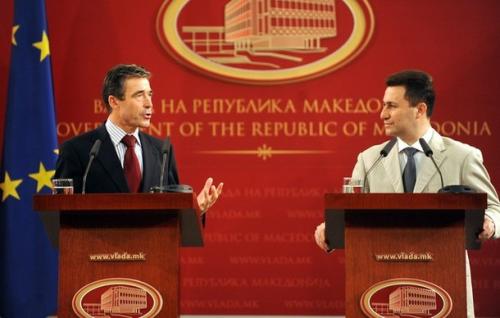
From Sally A. Painter, EurActiv: Macedonia has made dramatic progress in its effort to join both NATO and the EU. In addition to its economic and political reforms, Macedonia has been an active contributor to NATO’s peacekeeping missions, and is fully recognised by the Alliance. This reality made the 2008 NATO Summit in Bucharest – in which Macedonia’s nomination was blocked by a single government, Greece – particularly distressing. In 2008, Macedonia was clearly ready. Those of us involved in the process all witnessed up close the enthusiasm for Macedonia from nearly all NATO leaders. The unfortunate fact that Macedonia was blocked by a single member was a disappointment– and it should give us reason to rethink a system that allows a single government to hold absolute veto power over the entire Alliance. Is this really the Alliance of shared values?
Today, NATO is structured in such a way that all member states have an equal say in decision making – or decision breaking – power. Unfortunately, there has not been an equal amount of engagement and leadership on the part of the various member states. Though the opinion of all should be valued, when it comes to important matters of strategic decision making, and especially the critical Membership Action Plan, the current veto system is a recipe for dangerous gridlock. Rather, the opinion of a majority of members should determine policy.
The case of Macedonia demonstrates that unlimited veto power threatens to make NATO less responsive, restrictively bureaucratic, and subject to the mercy of any internal disagreement, no matter how small. When the opinion of NATO’s top contributors – the US, Germany, the UK, France, and Italy – is vetoed over an issue that is not relevant to the long term vision of the organisation, the Alliance, and the security of Europe, suffers. The UN Security Council is an instructive example of an institution that has recognised the need to limit veto power, as only the five permanent members are allowed a veto.
The beauty of NATO is that countries that were enemies’ only decades ago now sit together at the same table, sharing a commitment to the same vision and values. A fixation on regional rivalries degrades that unity. By contrast, the ongoing negotiations between Slovenia and Croatia offer a positive example of neighbours putting aside their differences in favour of advancing a common vision of a regional future. Despite outstanding issues in their negotiations, when it came to NATO expansion and the security of the region, Slovenia did not question Croatia’s qualifications for membership. It made the right decision for the Alliance and its own future security.
It is time for NATO’s leaders to recommit to the fundamental values of the organisation rather than being silent on the important issues. Former Secretary of State [Hillary] Clinton said at the 2012 NATO summit that the next summit will be focused on the enlargement agenda, in addition to what will surely be important talks on an Afghanistan exit strategy. This will be an excellent opportunity for the Alliance to correct its 2008 mistake and formally invite Macedonia to join, especially given the growing support from other regional leaders. In the past months, Hungary and the Czech Republic have both recognised Macedonia’s constitutional name, a clear sign of support for recommitting to the enlargement agenda.
Sally A. Painter is co-founder and chief operating officer at Blue Star Strategies, LLC. She is on the board of directors of the Truman National Security Project in Washington, D.C. (photo: Getty)
Image: getty%204%209%2013%20Rasmussen%20Macedonia.jpg
